

By Audience
- Therapist Toolbox
- Teacher Toolbox
- Parent Toolbox
- Explore All
By Category
- Organization
- Impulse Control
- When Executive Function Skills Impair Handwriting
- Executive Functioning in School
- Executive Functioning Skills- Teach Planning and Prioritization
- Adults With Executive Function Disorder
- How to Teach Foresight
- Bilateral Coordination
- Hand Strengthening Activities
- What is Finger Isolation?
- Occupational Therapy at Home
- Fine Motor Skills Needed at School
- What are Fine Motor Skills
- Fine Motor Activities to Improve Open Thumb Web Space
- Indoor Toddler Activities
- Outdoor Play
- Self-Dressing
- Best Shoe Tying Tips
- Potty Training
- Cooking With Kids
- Scissor Skills
- Line Awareness
- Spatial Awareness
- Size Awareness
- Pencil Control
- Pencil Grasp
- Letter Formation
- Proprioception
- How to Create a Sensory Diet
- Visual Perception
- Eye-Hand Coordination
- How Vision Problems Affect Learning
- Vision Activities for Kids
- What is Visual Attention?
- Activities to Improve Smooth Visual Pursuits
- What is Visual Scanning
- Classroom Accommodations for Visual Impairments

How to make Sensory Bottles for Self Regulation
- Free Resources
- Members Club
- Executive Functioning Skills , Occupational Therapy
Critical Thinking Skills
Colleen beck otr/l.
- by Colleen Beck OTR/L
- June 15, 2020
Critical thinking is intentional thinking that is involved in the process of completing tasks. In this post, we will dissect critical thinking. This essential executive functioning skill helps us accomplish complex tasks. Let’s talk critical thinking for kids!

What is Critical Thinking
Let’s start with executive function. Executive function encompasses the critical thinking skills of planning, organizing, prioritization, time management, working memory , attention , and other skills. Critical thinking is similar and requires the use of executive functioning. Critical thinking includes observing and analyzing, self-reflection, interpretation of available information, evaluation and inference (based on working memory), problem solving (metacognition), and decision making.
Within the aspects of critically thinking are many thinking and doing processes that allow us to follow through with the completion of tasks.
We’ve discussed previously that executive function does not fully mature until adulthood. It is important to recognize that fact because many times, we expect kids and teenagers to exhibit maturity in their decision-making and meta cognition.
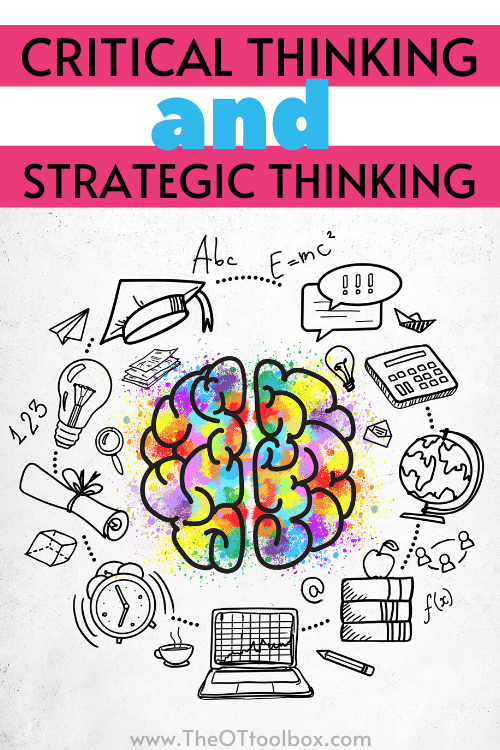
Strategic Thinking and Critical Thinking
Strategic thinking may be commonly known as a business term that describes savvy business decisions to lead a business to success. But, there are similarities between the strategic planning of a business and critical thinking involved in executive functioning tasks. In business, strategic thinking involves using a business plan as well as past successes and failures in order to reach business goals. Strategic thinking requires initiation, planning, prioritization, observation, and self-assessment.
Similarly, critical thinking in order to self-analyze, create goals, initiate tasks, and plan out a task follows along with the same process.
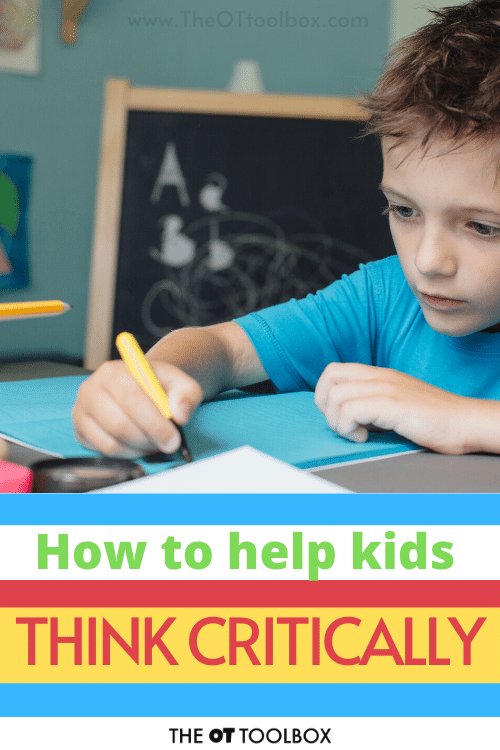
Critical thinking for kids
Critically analyzing given information so we can strategize a plan and follow through with that plan based on what we know sounds a lot like executive functioning, right? We know that executive functioning doesn’t fully develop until early adulthood. But, we ask a lot of our kids when it comes to integrating critical thinking/executive functioning/regulation.
These skills, together, allow us to integrate the areas of strategic thinking that we need to accomplish tasks:
-Regulate emotions and behaviors
-Pay attention during tasks
-Complete tasks with an awareness of working memory
-Initiate tasks when it can be hard to decide on the best “first step”
-Transition between tasks
Some of our kids really struggle with this process on a daily basis! Critical thinking in kids can be a real struggle, but we can help by breaking things down into bite-sized steps.
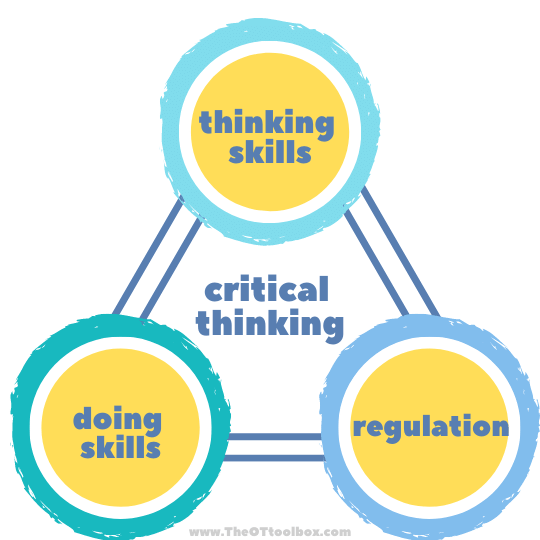
Critical Thinking Broken Down
When it comes to accomplishing a task, there are two parts that we need to separate. The first is the thinking of the task. The second is the actual doing of the task.
We’ll break down all of the specific pieces of critical thinking by dissecting the task of writing a book report.
Say you know a child who has a book report to write and it’s due on Monday. They’ve known about this project for some time and have read the book (mainly in class), but haven’t actually done any of the actual book report work. They have this weekend to get it completely finished to turn in on Monday morning, while going through the routine of a typical weekend: activities, events, chores, relaxation/down time…(sound like a familiar situation, parents?)
Let’s pull apart the process of knowing there is a book report due on Monday to the completion of that assignment. Talk about executive functioning skills and critical thinking, right??
Think of it this way: When a child has a book report to do, they know they need to do it. It’s been talked about in the classroom for a few days. The assignment might be in the back of their mind. So, when the child has the weekend to complete the book report, they know they need to start thinking about actually sitting down to do it. But, what about the Friday night time with friends? And the Saturday morning sleep-in time? And the baseball practice Saturday afternoon? And the family party that’s planed for Saturday evening? And, and, and? We are all well aware of exactly HOW FAST a weekend can slip away from us in the blink of an eye. There is a lot going on during a typical weekend! So pulling out time to actually break away from the “fun” and initiate a book report?? It’s not easy. It takes some skills: planning, prioritization, and task initiation. Then, they need to consider other things they have on their schedule during that weekend so they can plan ahead. (More Planning Skills)
Next, They need to plan out what they are going to write about. (Planning Skills)
They need to gather all of the materials they need to complete the task, like pencils, paper, and the book. (Organization Skills )
They need to recall important facts from the book and pull out that information. They need to recall how they’ve written a book report in the past or the assignments they’ve done in preparation for this project that will help them. They need to gather their thoughts to know where to even begin on this report and start thinking about a topic or a viewpoint they are taking with this report. (Working Memory)
Finally, they need to think about how they can use those facts and prior experiences to write statements that make sense in their book report. They need to think about what they’ve written in if they might need more information. They need to be self-reflective in their writing. (Metacognition Skills)
All of those tasks involved thinking about actually writing the book report. It didn’t involve the writing portion and accomplishing the task to fruition.
The next part of accomplishing the task of writing a book report involves the “doing”.
The child needs to regulate behaviors and emotions so they can stay on task without having an attitude or tantrum. They need to inhibit the desire to refuse to write the book report because they would rather check their phone or go play video games. (Response Inhibition)
They need to start the process of writing the report by sitting down and getting started on the book report and not get angry or upset by the task at hand. (Emotional Control)
They need to maintain attention during the entire task. (Sustained Attention)
There is a need to be flexible, as well. The student needs to adjust to other tasks that need accomplished during that weekend, and be flexible in their thinking and task completion. (Flexibility)
Finally, they need to actually complete the report to completion while retaining focused on their goal of getting that book report done so it can be turned in on Monday morning. (Goal Oriented Activity)

Critical Thinking Examples
It’s a lot to process, right? That project, when broken down, has some major skill building lessons within the assignment. Here are those specific skills again:
The thinking skills:
- Time Management
- Working Memory
- Metacognition
The doing skills:
- Response Inhibition
- Emotional Control
- Sustained Attention
- Task Initiation
- Flexibility
- Goal-directed Activity
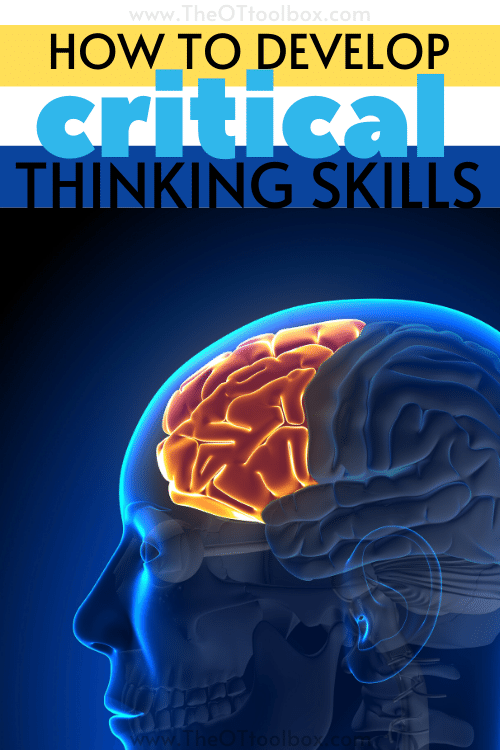
How to improve critical thinking
So, how can we take a major project like a book report and make it an assignment that helps kids build each of these critical thinking skills? By breaking down that assignment into bite sized pieces and working on each area!
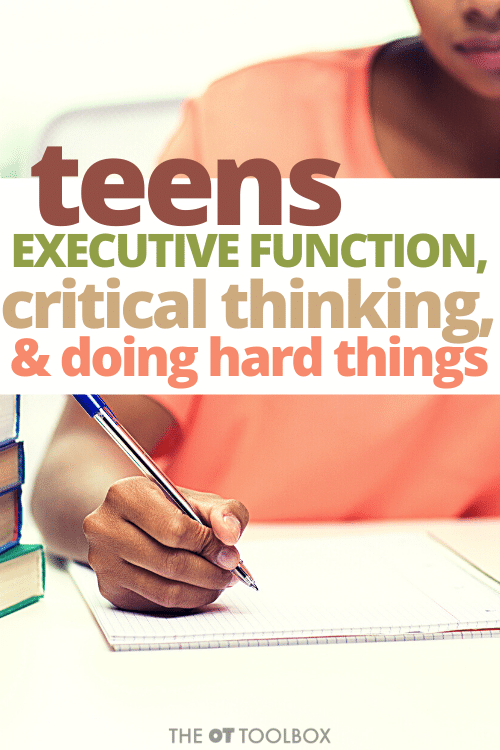
Kids with executive functioning skill challenges really struggle with critical thinking. And vice versa. Here are some ways to help teach kids impulse control for improved attention, self-regulation, and learning so they can do hard things:
- Goal tracker
- Reduce clutter
- Break big tasks or projects into smaller steps
- Make a schedule (picture-based or list)
- Social stories
- Act out situations beforehand
- Count to three before answering/responding
- Self-rewards
- Reduce time to complete tasks
- Increase time to complete tasks
- Think through and predict social interactions before going into a situation
- Control buddy
- Ask for help
- Habit tracker
- Use a strategy checklist
- Carry a goal list
- Positive thought notebook
All of these strategies are built and monitored in our resource, The Impulse Control Journal .
The Impulse Control Journal has been totally revamped to include 79 pages of tools to address the habits, mindset, routines, and strategies to address impulse control in kids. More about the Impulse Control Journal:
- 30 Drawing Journal Pages to reflect and pinpoint individual strategies
- 28 Journal Lists so kids can write quick checklists regarding strengths, qualities, supports, areas of need, and insights
- 8 Journal worksheets to pinpoint coping skills, feelings, emotions, and strategies that work for the individual
- Daily and Weekly tracking sheets for keeping track of tasks and goals
- Mindset,Vision, and Habit pages for helping kids make an impact
- Self-evaluation sheets to self-reflect and identify when inhibition is hard and what choices look like
- Daily tracker pages so your child can keep track of their day
- Task lists to monitor chores and daily tasks so it gets done everyday
- Journal pages to help improve new habits
- Charts and guides for monitoring impulse control so your child can improve their self-confidence
- Strategy journal pages to help kids use self-reflection and self-regulation so they can succeed at home and in the classroom
- Goal sheets for setting goals and working to meet those goals while improving persistence
- Tools for improving mindset to help kids create a set of coping strategies that work for their needs
This is a HUGE digital resource that you can print to use over and over again.

Read more about The Impulse Control Journal HERE . There are so many strategies to address attention in kids and activities that can help address attention needs. One tactic that can be a big help is analyzing precursors to behaviors related to attention and addressing underlying needs.

Colleen Beck, OTR/L has been an occupational therapist since 2000, working in school-based, hand therapy, outpatient peds, EI, and SNF. Colleen created The OT Toolbox to inspire therapists, teachers, and parents with easy and fun tools to help children thrive. Read her story about going from an OT making $3/hour (after paying for kids’ childcare) to a full-time OT resource creator for millions of readers. Want to collaborate? Send an email to [email protected].
More Posts Like This

- Attention , Sensory
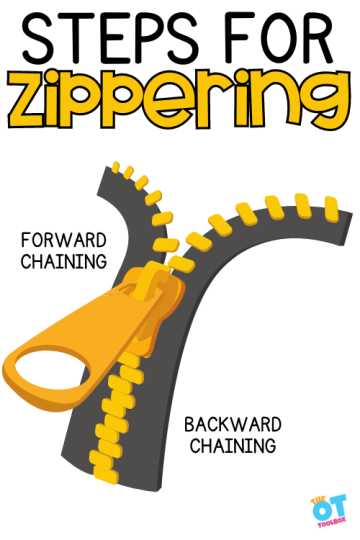
- Functional Skills , User Submitted
Teach Your Child To Zip a Jacket
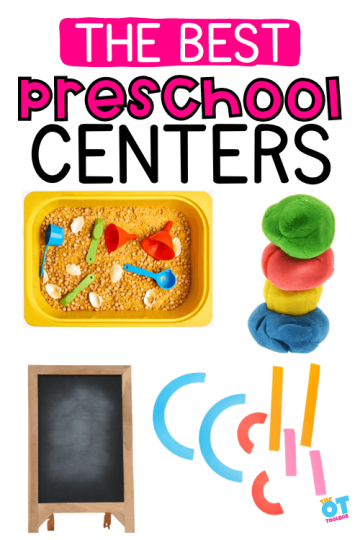
- Fine Motor Skills , Handwriting
Preschool Centers to Develop Pre-Writing Skills

- Attention , Executive Functioning Skills , Occupational Therapy Activities , Sensory
42 Ways to Help Students Stay Organized at School
Quick links, sign up for the ot toolbox newsletter.
Get the latest tools and resources sent right to your inbox!
Get Connected
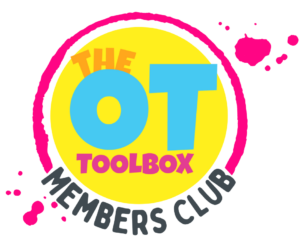
- Want to read the website AD-FREE?
- Want to access all of our downloads in one place?
- Want done for you therapy tools and materials
Join The OT Toolbox Member’s Club!
An official website of the United States government
The .gov means it’s official. Federal government websites often end in .gov or .mil. Before sharing sensitive information, make sure you’re on a federal government site.
The site is secure. The https:// ensures that you are connecting to the official website and that any information you provide is encrypted and transmitted securely.
- Publications
- Account settings
Preview improvements coming to the PMC website in October 2024. Learn More or Try it out now .
- Advanced Search
- Journal List

Research-based occupational therapy education: An exploration of students’ and faculty members’ experiences and perceptions
Kjersti velde helgøy.
1 Center of Diakonia and Professional Practice, VID Specialized University, Stavanger, Norway
Jens-Christian Smeby
2 Centre for the Study of Professions, OsloMet – Oslo Metropolitan University, Oslo, Norway
Tore Bonsaksen
3 Department of Health and Nursing Science, Faculty of Social and Health Sciences, Inland Norway University of Applied Science, Elverum, Norway
4 Faculty of Health Studies, VID Specialized University, Sandnes, Norway
Nina Rydland Olsen
5 Department of Health and Functioning, Faculty of Health and Social Sciences, Western Norway University of Applied Sciences, Bergen, Norway
Associated Data
In accordance with restrictions imposed by the Norwegian Data Protection Services (NSD) with ID number 8453764, data must be stored on a secure server at VID Specialized University. The contents of the etics committe`s approval resolution as well as the wording of participants` written consent do not render public data access possible. Access to the study`s minimal and depersonalized data set may be requested by contacting the project manager, KVH, email: [email protected] or the institution: on.div@tsop .
Introduction
One argument for introducing research in bachelor`s degree in health care is to ensure the quality of future health care delivery. The requirements for research-based education have increased, and research on how research-based education is experienced is limited, especially in bachelor health care education programmes. The aim of this study was to explore how occupational therapy students and faculty members experienced and perceived research-based education.
This qualitative, interpretative description consisted of three focus group interviews with occupational therapy students in their final year (n = 8, 6 and 4), and three focus group interviews with faculty members affiliated with occupational therapy programmes in Norway (n = 5, 2 and 5). Interviewing both students and faculty members enabled us to explore the differences in their experiences and perceptions.
Five integrative themes emerged from the analysis: “introducing research early”, “setting higher expectations”, “ensuring competence in research methods”, “having role models” and “providing future best practice”. Research was described as an important aspect of the occupational therapy bachelor program as it helps ensure that students achieve the necessary competence for offering future best practice. Students expressed a need to be introduced to research early in the program, and they preferred to have higher expectations regarding use of research. Competence in research methods and the importance of role models were also highlighted.
Conclusions
Undergraduate health care students are expected to be competent in using research. Findings from our study demonstrated that the participants perceived the use of research during training as important to ensure future best practice. Increasing the focus on research in the programme’s curricula and efforts to improve students’ formal training in research-specific skills could be a starting point towards increased use of research in the occupational therapy profession.
Occupational therapists have positive attitudes towards research, but implement research evidence infrequently within their daily practice [ 1 ]. Professional education is believed to play an important role in the development of positive attitudes towards evidence-based practice (EBP) skills [ 2 , 3 ]. One approach to improving evidence-based practice uptake in clinical practice is through the integration of research in education [ 4 , 5 ]. Developing student’s research skills is an important aspect of EBP [ 6 ] and participation in a research course has been found to improve nursing student’s attitudes towards research [ 7 ]. The World Federation of Occupational Therapists recommends an occupation-focused curriculum that includes critical thinking, problem-solving, EBP, research and life-long learning [ 8 , p. 6]. As such, educators in occupational therapy are advised to engage in research [ 8 , p. 53].
Several studies have explored how to link research and teaching in higher education [ 9 – 20 ]. Based on previous research [ 9 , 10 , 15 – 20 ], Huet developed a research-based education model that distinguishes between research-led teaching and research-based teaching [ 14 ]. Research-led teaching means that academics use their expertise as active researchers or use the research of others to inform their teaching. Research-based teaching means that students develop research skills by being involved in research or other inquiry-based activities. Research-led teaching and research-based teaching is interconnected, and research and teaching should be seen as interlinked [ 14 ]. One strategy for linking research and teaching is to bring research into the classroom, e.g. through academics presenting their research relevant to the subject and discussing research outcomes and methods with students [ 14 ]. In a research-based learning environment, students learn how to become critical thinkers, lifelong learners and to generate discipline-enriching knowledge [ 14 ].
Research-based education has mainly been emphasized in disciplinary university education [ 21 ]. In medical education, students’ knowledge, perceptions and attitudes towards research have been examined in several studies [ 22 – 25 ]. In their review, Chang and Ramnanan [ 22 ] found that medical students had positive attitudes towards research. Similar results emerged in Paudel et al.`s cross-sectional study [ 24 ]. Kandell and Vereijken et al. [ 25 ] found that first-year students believed that research would be important to keeping up to date in their future clinical practice.
Less research has been carried out on research-based education in bachelor’s programmes in health care, but the requirements for research-based education have also increased in these programmes [ 21 , p. 11]. Some studies have, however, investigated the attitudes, skills and use of research among nursing students [ 4 , 7 , 26 ]. In their literature reviews, Ross [ 7 ] found that nursing students have positive attitudes towards research and Ryan [ 26 ] found that nursing students are generally positive towards the use of research. Ross [ 7 ] noted that participation in research courses and research-related activity improved students’ attitudes towards nursing research. Leach et al. [ 4 ] have argued that undergraduate research education has an impact on nursing students’ research skills and use of EBP.
Students in occupational therapy and physiotherapy have been found to share positive attitudes towards research [ 27 ]. Similarly, studies have found positive attitudes towards EBP among occupational therapy students [ 28 – 31 ]. Stronge and Cahill [ 29 ] found that students were willing to practice EBP, but a lack of time and clinical instructors not practising EBP were perceived as barriers. Stube and Jedlicka [ 28 ] and Jackson [ 30 ] highlighted the importance of learning EBP through fieldwork experiences. DeCleene Huber et al. [ 31 ] found that students were least confident in EBP skills that involved using statistical procedures and statistical tests to interpret study results. These studies focused mainly on students’ attitudes and competence in EBP and research utilization (RU), and other elements of research-based education, such as student’s exposure to and engagement with research evidence were not investigated.
Few studies have explored faculty members’ perceptions of research in undergraduate education. Wilson et al. [ 32 ] found that the way in which university teachers in university disciplines translate research into learning experiences depends on their own personal perception of research. Some academics have highlighted that disciplinary content must be learned before engaging in research [ 32 ]. This idea is in accordance with the findings of Brew and Mantai [ 33 ], who also found variations in the way in which academics conceptualized undergraduate research. Experiences, attitudes and barriers towards research have been examined among the junior faculty of a medical university, and findings indicate that fewer than half of the participants in the study were involved in research at the time [ 34 ]. Ibn Auf et al. [ 35 ] found that the factors significantly influencing positive perceptions of research experience among the faculty at medical programmes were being male, having had education in research during undergraduate level, having been trained in research following graduation, and having undertaking years of research. To our knowledge, few studies have been conducted on faculty members’ perceptions of research in health care education, and we have identified only one such study related to occupational therapy education [ 36 ]. In a survey Ordinetz [ 36 ] found that the faculty members had a positive attitude towards research-related activities, and they considered research as an integral component of their role. Still, participants found research-related activities difficult to perform.
Research into how research-based education is experienced and perceived by faculty members and students is limited, especially in bachelor’s programmes in health care [ 21 , p. 11]. To gain a better understanding of the advantages or disadvantages of linking teaching and research, we therefor aimed to explore students’ and faculty members’ experiences and perceptions of research-based education in one bachelor’s programme in health care in Norway. Our specific research questions were:
- How do students and faculty members in occupational therapy programmes perceive the emphasis on research in the programme?
- How do occupational therapy students and faculty members perceive the expectations regarding research during the programme?
- What similarities and differences exist between the experiences and perceptions of students and faculty members regarding research-based education in the programme?
Context of the research
In Norway, it is required that higher education should be research-based [ 37 ]. According to the Act relating to universities and university college § 1–1 b, education must be on the cutting edge in terms of research, development work and artistic practice [ 37 ]. In a recent white paper on quality in higher education, research-based education is defined as education that is linked to a research environment; is conducted by staff who also carry out research; builds on existing research in a particular field; provides knowledge about the philosophy of science and research methods; and provides opportunities for students to learn how research is conducted from staff or students themselves conducting research as a part of their studies [ 38 ].
In Norway, six higher education institutions offer bachelor’s programmes in occupational therapy. The bachelor’s degree in occupational therapy consists of 180 European Credit Transfer and Accumulation System (ECTS) credits and covers four main areas of learning: the natural sciences, medicine, the humanities and the social sciences as described in the National Curriculum [ 39 ]. In total, clinical education consists of 60 ECTS. Philosophy of science and research methods comprise 6 ECTS, and research and development consist of 9 ECTS. The bachelor project module involves research and development work in occupational therapy and consists of 15–20 ECTS, with some variation across programmes. According to the national curriculum, the purpose of the occupational therapy education is to prepare students to be professionally up-to-date, future-oriented and research-based in their practice [ 39 ]. Students should be able to read research papers and use research results in their professional practice, and they should be able to justify their actions to users, other professionals and employers. These regulations have typically been operationalized as learning outcomes, such as: “Students will be able to apply relevant theories and research results, to understand people with activity problems as a result of somatic illness or injury, and to be able to make reasoned choices of intervention”, or “Students will be able to find and apply research to justify an intervention in occupational health” [ 40 ].
Most higher education institutions in Norway require that faculty members hold a master’s degree and many require a PhD or equivalent. It is regulated by law that at least 20% of faculty members in programmes at the bachelor’s level have PhD or equivalent according to the regulation concerning supervision of the quality of education in higher education § 2–3 (4) [ 41 ]. The amount of time that faculty members are able to use on research and development varies between institutions. The type of academic position will often influence the percentage of time for which they can apply; 20% of a full-time position for assistant professors, 30% of a full-time position for associate professors and 40% of a full-time position for full professors [ 42 ].
We used a qualitative design with empirical data from six focus group interviews, and the research strategy ‘Interpretative description’ guided the analysis. Interpretive description is an inductive approach inspired by ethnography, grounded theory and phenomenology [ 43 ], and is a research strategy suitable for studying phenomena in practical disciplines, such as nursing, teaching and management [ 44 ]. It is an approach driven by a fundamental belief in the rightness of striving to find better ways to serve one’s disciplinary purpose, and the potential of research to guide one there [ 43 , p. 12].
Participants
A purposive sample was recruited consisting of two different participant categories: final year occupational therapy students and faculty members. Participants were recruited from three different bachelor’s programmes in Norway. We contacted programme managers, who helped us recruit faculty members. We used the students’ digital learning platform to inform them about the study and students were encouraged to contact us via email should they wish to participate in the study. Focus group interviews with students were conducted after their final clinical placement, when they had just started working on their bachelor’s projects. The study sample for this project consisted of two groups: third-year occupational therapy students (n = 18), and faculty members (n = 12). In total, 30 persons between the ages of 21 and 64 participated in the study ( Table 1 ), 7 of whom were men.
*Held a bachelor’s degree in other subject area before entering the bachelor’s program in occupational therapy.
Data collection
In total, we conducted six focus group interviews with occupational therapy students and faculty members from three different bachelor’s programmes. All focus groups were conducted during the spring of 2019. The focus groups with students and faculty members were conducted separatly, due to differences in expertise and power; according to Krueger [ 45 , p. 22], this is necessary to ensure that participants feel free to speak openly. The size of the focus groups ranged from two to eight participants ( Table 1 ), and they lasted between 76 and 86 minutes. A digital voice recorder was used to audiotape each session. The focus groups were held at a convenient time and location for the participants, such as meeting rooms on campus. All participants were asked to provide written consent before participating in the study, and completed a form, giving brief details about their background. A thematic interview guide was developed, based on the aim of this study and on previous research on research-based education. The following topics were covered: 1) perceptions of the term “research-based education”; 2) expectations regarding the use of research in education, including clinical placements; 3) students’ involvement in research projects and the faculty’s experiences regarding such involvement; 4) faculty’ members participation in research; 5) experiences with teaching research methods and the philosophy of science; and 6) research-based education and future professional practice. The first author developed the interview guide, drawing on previous research on the subject, and in cooperation with the three other authors. The authors are faculty members at different educational institutions. All authors were interested in the topic of research-based education, and were experienced both in teaching and supervising health care students, and conducting focus groups.
Ethical considerations
The Norwegian Data Protection Services (NSD) approved the study (ID number 845364). Participation in the study was voluntary and the participants had the opportunity to withdraw from the study at any time without consequences. All transcripts and notes were anonymous and written consent was obtained from all the participants. None of the authors conducted focus group interviews with their own colleagues.
Previous research into research-based education served as an important starting point for the interview guide and the analysis. Interpretive description guided the process of analysing the data [ 43 ]. The co-moderators took notes during the focus group interviews, and all focus group interviews were transcribed verbatim. After each focus group interview, the moderator and co-moderator engaged in a short debriefing session. The first and last author (KVH and NRO) performed the analyses, separately at first, followed by a joint analysis in which the two authors discussed and compared their interpretation of the data and agreed on patterns and themes. Word processing was used to analyse the data, and the analysis consisted of a series of operations: 1) reading the transcripts many times while being as open-minded as possible; 2) writing marginal remarks by consistently questioning the text and pointing out important points, potential themes or patterns; 3) condensing; 4) broad coding, 5) comparing and contrasting within focus groups with similar participant categories; and finally 6) comparing and contrasting focus groups compromised of different participant-categories. Comparing and contrasting within and between focus group interviews, enabled us to generate patterns and themes within the entire data set.
The analysis was characterized by a back and forth process that involved taking things apart and putting them back together again. Throughout this process, the first author frequently returned to the transcripts to ensure that the interpretations reflected the data. To ensure rigor and credibility in the analysis, the authors stepped away from the data periodically to ask questions such as: “what am I seeing?”, “why am I seeing that?”, “how else might I understand this aspect of data?”, “what might I not be seeing?” and “what are they not telling me?” [ 43 , p.174]. This approach prompted the authors to see the data through “alternative lenses” and to acknowledge that there was much else to be seen [ 43 , p. 174].
The aim of this study was to explore how occupational therapy students and faculty members experienced and perceived research-based education. Across the focus group interviews, we identified five integrative themes; “introducing research early”; “setting higher expectations”; “ensuring competence in research methods”; “having role models”, and “providing future best practice”. Students felt it was important to be introduced to research early on in the programme, meet high expectations regarding the use of research, gain competence in research methods and have role models who use research evidence during clinical education. Faculty members felt that students needed competence in research methods and they highlighted the importance of linking research to professional practice. We found the most contrasting views between students and faculty members to be related to the theme “setting higher expectations”. While the students would have liked more focus on research, the faculty members discussed whether expectations regarding the use of research were too high. Both students and faculty members across the focus group interviews believed that research-based education was important with regards to helping students achieve the necessary competences to provide future best practice.
Introducing research early
Across the focus group interviews, several students expressed the belief that focusing on research early in their education would better enable them to read and understand research during their training. Furthermore, one participant highlighted that occupational therapists are expected to integrate up-to-date research findings in their practice, and learning about research in the early stages was important in order to ensure this competence. Most students questioned the timing of when research should be introduced to students during their training. One of these students was of the opinion that learning about research should be mandatory from the start of the programme:
“I wished that teaching related to research was mandatory early in my studies. Everything you want to be good at requires practice, right? I wished that I had better research skills; [in particular concerning] searching for and using articles before we started working on our bachelor’s project.” (Student, Focus group 3)
This participant had also experienced benefits, such as higher grades, when using research articles in assignments. One of the other students highlighted that critical thinking is also part of research-based education. Students expressed a need to be critical with regard to research, and several of them wished that the curriculum had focused on how to read an article critically. Some of the participants pointed out that the use of research was not introduced until their final year, which they felt was too late.
Learning about research early on in the programme was also mentioned in one of the focus group interviews with faculty members. Some of the faculty members believed that learning to use research should be introduced at the start of the programme, as research is a natural part of academic development. For students to be able to read research articles early, they must also learn about research methods early on in the programme.
“I think it is important for [students’] academic development to start early. That they start early, and really expects that they will implement it in their first, second and third year, and that it won’t just come abruptly in third year.” (Faculty member, Focus group 6)
In contrast to this, one of the faculty members expressed that early on, some students seem more focused on understanding what it will be like to practice occupational therapy, rather than learning about research evidence:
“Of course, one must start [focusing on research], but I understand students who wish to understand what the profession is like first and foremost, right? What will my day consist of as a clinician when I graduate, that is what they want to know first, right?” (Faculty member, Focus group 6)
This faculty member felt that first-year students strived to grasp the concept of occupational therapy, and that understanding the profession is essential early on in their training. Later, students can develop their understanding and use of research evidence.
Setting higher expectations
Several students expressed that they would have preferred their teachers to have set higher expectations early on regarding the use of research during their training. They had the impression that the expectations had changed for new student cohorts, and they wished that they had been given the same opportunity. In contrast, however, one student described having been given clear expectations regarding the use of research articles during the first year, although these expectations decreased as the program progressed. This participant felt that the expectations regarding the use of research in assignments were too low, especially after the first year:
“It… seems sufficient to include a sentence from an article, and to refer to one research article in the reference list, and then it is okay in a way. I think the expectations are too low. We must include a research article, but why do we do this really? What is the point? Nothing more is required.” (Student, Focus group 2)
Some students also experienced that the expectations regarding the use of research use were too low during their clinical placements. They expressed that it was unusual to talk about theory and research during placement. As future clinical instructors, they would expect more research use from their students.
We found the most contrasting views between students and faculty members regarding this theme. While students would have liked more focus on research, the faculty members discussed whether expectations regarding the use of research were too high. In one focus group with faculty members, participants discussed how students’ motivations regarding the use of research varied. In their experience some of the students were mainly interested in hands-on practice, whereas others were more interested in research. In another focus group, faculty members indicated that they were satisfied with the requirements and expectations regarding research use among their students. They highlighted that learning about research requires maturation, and that the extent to which research can be integrated during training is limited.
Another factor that was highlighted by faculty members was a fear that the increased demand for research-based education could create a distance to professional practice. Some participants highlighted that it takes time to understand the profession and that too much emphasis on research in education could threaten this process. In one focus group interview, there was a discussion regarding how to balance the emphasis on research and profession- specific knowledge:
One participant remarked that research was too much in focus:
“In light of the national expectations regarding research-based and evidence-based practice, we need to ask ourselves, what is our profession, right? We live in a time and a society where evidence-based practice and research is almost emphasized too much.” (Faculty member, Focus group 6)
In contrast, however, one of the other faculty members in the same focus group, stated that one does not forget the importance of the occupational therapy profession when conducting research, and emphasized the importance of research in education.
In another focus group interview, some of the faculty members were concerned about the increasing demand for research competence among faculty members. They feared a situation where the majority of the faculty might have research competence, but limited clinical experience, which might affect the students’ learning of specific occupational therapy skills:
“Occasionally I fear that we have less of the experience-based knowledge in the faculty, now that faculty members are expected to have a PhD. Many [faculty members] start their career at the university colleges and universities and complete the doctoral degree, without having much clinical experience.” (Faculty member, Focus group 1)
Ensuring competence in research methods
Both students and faculty members highlighted that student’s needed competence in research methods. The students emphasized the need for more competence and skills regarding quantitative methods and statistics, to enable them to read and understand research articles. Several students stated that, while they had some knowledge about qualitative methods, they had not learned much about quantitative methods. The importance of competence in research methods was highlighted in one of the focus group interviews with students:
“If you have competence in [research] methods, then it might be easier to read and understand a research article. Often when I try to read a research article about something medical, I skip the methods section because I don’t understand it.” (Student, Focus group 2)
Students believed that reading research articles prepared them for clinical work. In fact, one participant was very aware of a lack of competence in research methods during a clinical placement and expressed this as follows:
“I experienced that clinical instructor said in the beginning of the placement “you [as a student] can use research, as you are good at it”. “This is perhaps a bit unfortunate, since we haven`t been sufficiently introduced to how to find and interpret research, and not early enough. As such, we didn’t used it [research] in the placement, because we haven’t been confident enough.” (Student, Focus group 3)
Competence in research methods was also discussed in relation to students’ bachelor’s projects. Students expressed that it was too late to start learning about research methods in the final year. If research methods were not introduced at an earlier stage, students felt unprepared for their bachelor’s project. Students stated that expectations regarding research use only took place in one exam, and they wished that they had been challenged more regarding the use of research throughout the programme. Benefits from reading research articles compared with regular textbooks were highlighted, such as learning more about the results from interventions within different patient groups. Faculty members also felt that teaching methods and the philosophy of science was not sufficiently integrated in the programme. They noted that a consequence of this was a lack of competence in research methods among students, which in turn was a challenge regarding student participation in research projects initiated by faculty members. As one participant explained:
“What I think now is that of course they have received too little teaching related to research methods to be able to contribute. I have a bad conscience that they have received too little basic knowledge to get started doing it.” (Faculty member, Focus group 5)
Having role models
Some of the students experienced working alongside role models who used research evidence, both on campus and in clinical placements. With regards to clinical instructors acting as role models, one of the students stated:
“The clinical instructors used a lot of research, so I felt that I also had to [use research evidence] to keep on track.” (Student, Focus group 2)
A student from another focus group also experienced clinical instructors as expecting students to use research, although this varied from placement to placement:
“If I had treated a patient, I had to justify this with research, but it was mostly when I had placements in hospitals, so it depended very much on the clinical placement site.” (Student, Focus group 4)
Some of the students encountered the expectation that nearly all treatments performed during their placements should be justified with research evidence, especially in hospital-based services. For example one particular student described:
“In my final clinical placement in occupational health services, it was only research that mattered. At this placement you were expected not to say anything without reading up on legislation and the latest knowledge.” (Student, Focus group 4)
In contrast to this, however, several other participants had the impression that their clinical instructors did not use much research but instead emphasized experienced-based knowledge and placed more emphasis on the students’ interaction skills. These students perceived that their clinical instructor’s decision-making was based on experience-based knowledge. One participant experienced this lack of emphasis on research in clinical placements as follows:
“My clinical instructor in my last clinical placement, started to say “I am probably not going to test you on use of research evidence, because there you are superior to me, since it has been so long since I have done that. Rather, I will keep an eye on your communication skills and how you appear.” (Student, Focus group 2)
Later in the focus group interview, the same participant stated:
“I wasn’t surprised, because this experience was similar to earlier experiences from other clinical placements: that we are not challenged on research-based stuff by the clinical instructor.” (Student, Focus group 2)
This is similar to the view of another participant who expressed that research use was not visible in any of the clinical placements. Despite or perhaps because of this experience, this participant saw the need to use research to keep-up-to date in future clinical practice.
Faculty members across the focus group interviews noted a variation regarding clinical instructors’ engagement in research evidence; however, one participant highlighted an increasing focus on research among clinicians:
“I always address [research] during clinical placement visits when clinical instructors are present, and I experience that the practice field is much more focused on research now than before. Many say that this is thanks to the students.” (Faculty member, Focus group 1)
As such, students could also influence the use of research evidence during clinical education. One of the faculty members confirmed this when noting that the students requested justifications based on research after lectures on making orthoses. This faculty member recalled that students had stated that they wished the clinician lecturer had used research evidence to better justify this type of intervention. The faculty member believed that students developed their critical thinking skills during the programme and became increasingly interested in how research supported clinical decisions. Some of the faculty members highlighted that they made an effort to stimulate students’ critical thinking skills, and that they were focused on educating students that could integrate critical thinking into their professional practice.
Students also experienced faculty members as role models in terms of using research in various ways. Some of the students described a difference between younger and more experienced faculty members. They found that younger faculty members who held a PhD and were recently hired, were more focused on research than faculty members with more clinical experience. The students described this as a generational shift that has possible led to an increased focus on research in the programme recently. Overall, the students’ impression of their teachers as active researchers varied. Some students had the impression that some of their teachers did not conduct much research, and others had the impression that all of the faculty members conducted research, that they invited students to participate in their projects, and that their research was visible both in their teaching and in reading lists:
“They talk about their research projects, so everyone as far as I know is involved in research in some way. I also see their names on research articles.” (Student, Focus group 3)
Furthermore, none of the students in the three focus group interviews remembered that teachers had focused on research during students’ clinical placements visits:
“I didn’t get any questions about research from the teacher during my placement visit. In a way I feel that everybody says that research is so important, but it feels like it is mostly experience-based.” (Student, Focus group 2)
In one of the focus group interviews with students, some participants described their uncertainly regarding whether their teachers were basing their lectures on research, as the Power Point presentations often lacked references. One student remarked:
“Since [the teachers] refer to theory using old sources, I don’t trust that they have searched for new research.” (Student, Focus group 3)
Providing future best practice
Across the focus group interviews, participants perceived that research in occupational therapy bachelor’s programmes was important with regard to helping students achieve the necessary competence to provide future best practice. Both students and faculty members expressed a need to use research as an information source to justify their professional practice to other professions and collaborators. From the students’ perspective, research can provide professional credibility and drive the profession forward. One student expressed the following:
“You… desire that the intervention or the treatment or what you provide is the most professionally credible option, and that this option will have the best possible effect.” (Student, Focus group 2)
This participant described the importance of incorporating research in training and clinical placements, to ensure that graduates integrate research in future clinical practice. Furthermore, the participant expressed a responsibility to keep-up-to date with research. One of the other participants in this focus group agreed, and emphasized that when working with patients, it is important to be familiar with the latest research evidence in a particular field.
Faculty members emphasized that graduates should have the necessary competence to be able to justify treatment choices to meet the demands of society. One of the faculty members stated that emphasis on research in the programme would probably increase the focus on research after graduation, when students would be less exposed to research than they were during their training. Another stated explicitly that being able to justify treatments using research, as opposed to using intuition only, could empower students in their future practice:
“When you work in hospital-based services, if you suggest an intervention, then you will be asked why you would do that and then you can justify it with research. And that is something I believe, the benefits of empowering our students to meet the demands of society, especially in hospital-based services.” (Faculty member, Focus group 1)
Our aim was to explore how occupational therapy students and faculty members experienced and perceived research-based education. We found that students were engaged in learning about research and they considered research to be important. Both students and faculty members perceived that research in bachelor’s programmes was important with regards to helping students achieve the necessary competence to provide future best practice in occupational therapy. Students expressed a need to be introduced to research in the early stages of the programme, and for higher expectations regarding the use of research during their education. Both students and faculty members acknowledged the need for students to gain competence in research methods, as this would enable them to read research articles and participate in research projects. Students maintained that both clinical instructors and faculty members were important role models in the use of research evidence.
In this study, students expressed that they would have preferred to learn about research earlier in their programme, and some of the faculty members highlighted that integrating research at an early stage was important for academic development. Early integration of research and enquiry has also been emphasized by Healey and Jenkins [ 15 ] and Jenkins and Healey [ 46 ]. Jenkins and Healey [ 46 ] have suggested that institutions and departments develop courses that engage students in research and enquiry from the beginning of their first year. They used the term “enquiry” to highlight the importance of curiosity, as well as critical thinking. An argument for early integration of research and enquiry is to enhance the linkage between teaching and discipline-based research [ 15 ]. Walkington et al. [ 47 ] have argued that all undergraduate geography students would benefit from early attempts to develop skills in enquiry and research. They found that students felt more prepared to undertake research independently when they were given the opportunity to practise research skills in advance [ 47 ]. This is relevant to our study findings, as the bachelor’s project in the final year in the occupational therapy programmes involves research-related tasks, but learning research methods takes time. Accordingly the students who participated in our study reported that they would have liked to learn about research methods earlier, as this would have better prepared them for undertaking their bachelor’s project.
Some of the faculty members in our study believed an early introduction to the use of research is a part of academic development and the importance of progressing in this area throughout the programme was underlined. In contrast, however, one of the faculty members expressed that, in the early stages of the programme, some students seemed to be more focused on understanding the role of the occupational therapist than learning about research. This contrasting view coincides with the findings of Wilson et al. [ 32 ], who found that some academics appear to have a hierarchical understanding of research, in which disciplinary content must be learned before engaging in research. Nevertheless, students and faculty member alike explicitly articulated the need for students to develop and learn critical thinking skills at an early stage in their programme, such as how to read an article critically. Critical thinking skills were highlighted as being both important for professional practice and research-based education. However, integrating the use of research evidence early also comes with challenges. Kyvik et al. [ 48 ] found that undergraduate professional students developed only limited understanding of research. This speak to the importance of integrating the use of research as early as possible in students’ training, as these are competences that students need in order to engage in evidence-based practice as professionals.
Most of the students experienced a lack of expectations regarding the use of research in assignments and during clinical placements, whereas some of the faculty members wondered whether the expectations were too high. Some faculty members feared that the increased demand for research-based education could widen the gap between education and professional practice. Interestingly, it appears that engaging in research and professional practice may be perceived as two separate domains, with some ambiguity concerning the role of research in the occupational therapy profession. This provides further support to Kyvik’s [ 21 , p. 142] argument that research-based education in bachelor programmes in health care should place an emphasis not just on enquiry-based learning but its relevance for professional practice.
Both students and faculty members in our study described competence in research methods among students as important. Students reported a need for competence in research methods, including quantitative methods, to be able to understand research articles. Moreover, faculty members reported that the lack of students’ competence in research methods could represent a challenge when including students in their own research projects. However, Decleene Huber et al. [ 31 ] found that students lacked confidence in using statistical procedures and statistical tests to interpret study results. Kyvik et al. [ 48 ] and Brew and Mantai [ 33 ] found that undergraduates lacked the research skills needed to be involved in faculty projects. This represent a potential challenge, as most students in our study reported that they wanting to know more about their teachers’ research and to be involved in their research projects. Students also highlighted that involvement in faculty research might be a way to inspire them to continue with research in the future. Healey and Jenkins [ 15 ] have argued that students seemed more motivated if they were integrated in their teachers’ research projects at an early stage in their studies. Moreover, Smyth et al. [ 49 ] claimed that students value research experience and experienced benefits from engaging in research such as an improved understanding of the research process, increased critical thinking and professional and practical skills. This supports the view that learning about research methods, including quantitative and statistical methods, should be integrated throughout the programme.
In our study, students highlighted the importance of role models with regards to using research, especially during clinical placements. Students reported that they were positively influenced by clinical instructors who used research in their work, and as a result, they felt obliged to use research to maintain their own professional development. Students who had experienced the opposite still reported that they had searched for and used research evidence to keep-up-to date. The importance of role models in promoting EBP and the use of research evidence has been reported in several studies [ 28 – 30 , 50 , 51 ]. Olsen et al. [ 50 ] and McCluskey [ 51 ] found that clinical instructors were important role models regarding EBP for students in clinical placements. Stube and Jedlicka [ 28 ] have suggested that educators have a role in assisting students to become scholarly consumers of evidence. In our study, most of the students had the overall impression that faculty members used research in their teaching, but the degree to which students were involved in research projects varied. In one focus group interview, students highlighted that all the faculty members were active researchers and published articles. However, students found that faculty members visiting students during placements were less inclined to focus on research. Some students also reported a focus on experienced-based knowledge more than on research-based knowledge among some clinical instructors. Closer cooperation between education and practice might be a way to increase the emphasis on research during clinical placements. Role models for use of research is of importance.
Experience with research and development work during training may enhance interest in applying research in one’s future working life [ 48 ]. Future quality health care delivery is often a main argument for integrating research in bachelors’ programme in health care education, such as occupational therapy education. In our study, both faculty members and students highlighted the importance of focusing on research in training to ensure that graduates have the necessary competence to provide future best practice. Previous research findings also indicated that students have a strong belief in the value of research for their future clinical practice [ 25 ] and desire to keep up-to-date in their field [ 23 ]. To achieve this, it is important that students start as early as possible and ideally during their formal education [ 2 ]. Deicke et al. [ 52 ] have highlighted that students need to work with actual research literature, develop research designs and undertake empirical research to increase their interest in research. Findings from our study indicate that emphasis should be placed on introducing the use of research at an early stage in the programme and higher expectations should be set for students regarding the use of research, both on campus and during clinical placements, to ensure that students achieve competence in research methods and that they are exposed to role models who use research evidence.
Occupational therapists have positive attitudes towards research, but infrequently implement research evidence in their daily practice [ 1 ]. This may be due to barriers such as lack of time to read research, insufficient facilities and difficulty understanding statistical analyses [ 53 ]. Results from our study indicate that a link between research and profession-specific knowledge is necessary for research-based education in bachelor’s programmes in health care education. Research should be integrated in teaching. Along this lines, Huet [ 14 ] has argued that faculty members need to be engaged in a scholarly manner within their disciplinary field, and has highlighted the importance of raising a culture of research and teaching as two integrated activities. Learning in a research-based education environment may ensure that students enriches the knowledge in their discipline [ 14 ]. Students need to be socialized into a culture of research. Ideally, the learning of research-specific skills should be integrated into all fields of learning in a programmes curricula and include skills in critical thinking, problem-solving, EBP and research, as emphasized by WFOT [ 8 ]. Increasing focus on research in curricula and improving the students’ formal training in research-specific skills could be a starting point towards increased use of research in the occupational therapy profession.
Limitations
This study explored the experiences and perceptions of occupational therapy students and faculty members regarding research-based education in three different occupational therapy programs in Norway. Conducting focus group interviews with both students and faculty members enabled us to explore and compare differences in perceptions and experiences. Focus groups compared to individual interviews can potentially create a synergy that is not possible in individual interviews [ 54 , p. 18]. The challenge with this method, is that there is a possibility that dominant participants can influence the results and participants tend to intellectualize [ 45 , p. 22, 13]. In our study, we did not experience dominant participants, although one of the participants in one of the focus group interviews contributed very little. We made efforts to include this participant more directly in the conversation.
This study was conducted in the early phase of third-year students’ bachelor’s projects. There is a possibility that the students were more focused on research during this phase of their training. It is also possibly that students who participated in this study could have been more interested in research-based education than students who chose not to participate. While a specific interest in research-based education may also have been the case for the faculty members who chose to participate in the study, we note that only three of the participating faculty members held a PhD or equivalent, and the majority of their experience originated from clinical practice. Thus, when considering the faculty’s views as expressed in this study, the characteristics of the group should be considered. In addition, one of the focus groups, made up of faculty members consisted of only two participants. A strenght of our study, is that two authors conducted the analysis. We considered using member checking, but decided against it, as, according to Thorne [ 43 p. 175], member checking can lead to false confidence if the participants confirm what you thought or potentially derail you from good analytic interpretations if they do not. With regards to the participants, however, we feel that including both students and faculty members as study participants represents a strength of the study. A corresponding limitations is that we are unable to assess the extent to which the study sample is representative of the population of faculty and students in occupational therapy education in Norway. However, as establishing representativity is generally not an aim of qualitative studies, and according to Thorne [ 43 , p. 105], there is no definitive rule regarding the correct sample size for an interpretive description study, we believe our findings still offer important insights for the field.
This study explored the experiences and perceptions of occupational therapy students and faculty members from three occupational therapy bachelor’s programmes in Norway regarding research-based education. Students in these programmes are expected to be competent in using research evidence. Findings from our study show that both students and faculty members perceive the use of research during training as important in order for students to provide future best practice. Furthermore, findings indicate that setting high expectations regarding the use of research early on, may be important in a bachelor’s programme in health care such as occupational therapy. Ensuring competence in research methods seems to be essential for achieving success in terms of research-based education. Moreover, clinical instructors and faculty members were highlighted as important role models in the use of research evidence. Future research is needed that focuses on the use of research by clinical instructors and their expectations of students regarding using research in clinical placements. Quantitative studies are also needed, so that a wider population can be reached, as are more focus groups among students and faculty members in other professional education programmes.
Supporting information
S1 checklist, funding statement.
The author(s) received no soecific funding for this work.
Data Availability
- PLoS One. 2020; 15(12): e0243544.
Decision Letter 0
22 Jul 2020
PONE-D-20-09978
Research-based occupational therapy education: an exploration of students` and faculty members` experiences and perceptions
Dear Dr. Helgøy,
Thank you for submitting your manuscript to PLOS ONE. After careful consideration, we feel that it has merit but does not fully meet PLOS ONE’s publication criteria as it currently stands. Therefore, we invite you to submit a revised version of the manuscript that addresses the points raised during the review process.
All reviewers pointed to main strengths of the manuscript. But they identified issues, especially at the conceptual and methodological level, that require major revisions.
Please submit your revised manuscript by Sep 05 2020 11:59PM. If you will need more time than this to complete your revisions, please reply to this message or contact the journal office at gro.solp@enosolp . When you're ready to submit your revision, log on to https://www.editorialmanager.com/pone/ and select the 'Submissions Needing Revision' folder to locate your manuscript file.
Please include the following items when submitting your revised manuscript:
- A rebuttal letter that responds to each point raised by the academic editor and reviewer(s). You should upload this letter as a separate file labeled 'Response to Reviewers'.
- A marked-up copy of your manuscript that highlights changes made to the original version. You should upload this as a separate file labeled 'Revised Manuscript with Track Changes'.
- An unmarked version of your revised paper without tracked changes. You should upload this as a separate file labeled 'Manuscript'.
If you would like to make changes to your financial disclosure, please include your updated statement in your cover letter. Guidelines for resubmitting your figure files are available below the reviewer comments at the end of this letter.
If applicable, we recommend that you deposit your laboratory protocols in protocols.io to enhance the reproducibility of your results. Protocols.io assigns your protocol its own identifier (DOI) so that it can be cited independently in the future. For instructions see: http://journals.plos.org/plosone/s/submission-guidelines#loc-laboratory-protocols
We look forward to receiving your revised manuscript.
Kind regards,
Sara Rubinelli
Academic Editor
Journal Requirements:
When submitting your revision, we need you to address these additional requirements.
1. Please ensure that your manuscript meets PLOS ONE's style requirements, including those for file naming. The PLOS ONE style templates can be found at
https://journals.plos.org/plosone/s/file?id=wjVg/PLOSOne_formatting_sample_main_body.pdf and
https://journals.plos.org/plosone/s/file?id=ba62/PLOSOne_formatting_sample_title_authors_affiliations.pdf
2. Please include a copy of Table 2 which you refer to in your text on page 14
[Note: HTML markup is below. Please do not edit.]
Reviewers' comments:
Reviewer's Responses to Questions
Comments to the Author
1. Is the manuscript technically sound, and do the data support the conclusions?
The manuscript must describe a technically sound piece of scientific research with data that supports the conclusions. Experiments must have been conducted rigorously, with appropriate controls, replication, and sample sizes. The conclusions must be drawn appropriately based on the data presented.
Reviewer #1: Yes
Reviewer #2: Yes
Reviewer #3: Yes
2. Has the statistical analysis been performed appropriately and rigorously?
Reviewer #1: N/A
Reviewer #2: N/A
Reviewer #3: N/A
3. Have the authors made all data underlying the findings in their manuscript fully available?
The PLOS Data policy requires authors to make all data underlying the findings described in their manuscript fully available without restriction, with rare exception (please refer to the Data Availability Statement in the manuscript PDF file). The data should be provided as part of the manuscript or its supporting information, or deposited to a public repository. For example, in addition to summary statistics, the data points behind means, medians and variance measures should be available. If there are restrictions on publicly sharing data—e.g. participant privacy or use of data from a third party—those must be specified.
4. Is the manuscript presented in an intelligible fashion and written in standard English?
PLOS ONE does not copyedit accepted manuscripts, so the language in submitted articles must be clear, correct, and unambiguous. Any typographical or grammatical errors should be corrected at revision, so please note any specific errors here.
5. Review Comments to the Author
Please use the space provided to explain your answers to the questions above. You may also include additional comments for the author, including concerns about dual publication, research ethics, or publication ethics. (Please upload your review as an attachment if it exceeds 20,000 characters)
Reviewer #1: Thank you for the opportunity to review this paper, which explores students’ and faculty members’ experiences with and perceptions of research-based occupational therapy education. The study method was described in detail and the analysis was conducted in line with the interpretative description methodology. I particularly enjoyed reading the quotes, which further demonstrated the depths of the research finding.
I have some concern with the way that ‘research-based education’ is conceptualised in the manuscript. Research-based teaching refers to teaching practice “…when academics plan, deliver and assess students’ work through their involvement in research or inquiry-based activities” (p.728, Huet, 2018 – Research-based education as a model to change the teaching and learning environment in STEM disciplines, published in the European Journal of Engineering Education, 43:5, 725-740). A similar term – ‘research-lead teaching’ – occurs when academics use their expertise as active researcher or use the research of others to inform teaching. Without knowing how the occupational therapy curriculum is structured, I find it difficult to accept that it is indeed research based. It would have been beneficial for the authors to give more detail about how the curriculum is designed and delivered and to provide a few examples of research-based learning activities. Why is occupational therapy education considered as a short professional education programme, given that it is a bachelor degree? What are the expectations placed on the lecturers teaching in the occupation therapy programme, in terms of their engagement with research? Are they all clinicians? Again, providing more information about the course structure might help reduce the confusion here.
I would have liked to see more rationale given to using interpretive description as the study methodology. What’s the advance of this approach and why is it most suitable for the current study?
Participants commented on the fear that “… the increased demand for research-based education could cause a distance to professional practice”. It would be important to discuss whether comments like this fits the overall research-based model and to provide solutions to reduce such fears. I personally think that research and teaching should not be competing against each other and that the whole premise of research-based education is to incorporate research into teaching, as a means to facilitate active inquiry and critical thinking.
Reviewer #2: 1) 1. The qualitative research in the care activities is interesting, related to the management of good health science education in explaining the views, phenomena and perceptions of both the instructor and the learner.
2. The method should be improved to give details of the research methodology to understand more clearly how to do, what to do and how to analyze in order to get reliable research results Due to a small sample number
3) 3) Summary of themes is good but should make the diagram interesting In order for readers to understand the elements discovered in quality research more clearly, will make this research suitable for dissemination that useful in occupational therapy for the publication of world-renowned journals. Should adjust the diagram to be clear
In my opinion, this paper is good for occuaptional therapy education and health science education. It can share in PLoS ONE journal to contribute around the world. I’m Ok accpet thay Minor Revision,
Best Regards
Supat Chupradit, Ph.D.
Assistant Professor in Occupational Therapy, Depaertment of Occupational Therapy, Faculty of Associated Medical Sciences, Chiang Mai University, Thailand
Reviewer #3: Exploring the perceptions of OT students and faculty regarding their experiences with receiving education about research is an important topic related to encouraging evidence-based practice in the field of OT. See attached review for detailed comments and recommendations for revision.
6. PLOS authors have the option to publish the peer review history of their article ( what does this mean? ). If published, this will include your full peer review and any attached files.
If you choose “no”, your identity will remain anonymous but your review may still be made public.
Do you want your identity to be public for this peer review? For information about this choice, including consent withdrawal, please see our Privacy Policy .
Reviewer #1: Yes: Yan Chen
Reviewer #2: Yes: Supat Chupradit
Reviewer #3: No
[NOTE: If reviewer comments were submitted as an attachment file, they will be attached to this email and accessible via the submission site. Please log into your account, locate the manuscript record, and check for the action link "View Attachments". If this link does not appear, there are no attachment files.]
While revising your submission, please upload your figure files to the Preflight Analysis and Conversion Engine (PACE) digital diagnostic tool, https://pacev2.apexcovantage.com/ . PACE helps ensure that figures meet PLOS requirements. To use PACE, you must first register as a user. Registration is free. Then, login and navigate to the UPLOAD tab, where you will find detailed instructions on how to use the tool. If you encounter any issues or have any questions when using PACE, please email PLOS at gro.solp@serugif . Please note that Supporting Information files do not need this step.
Submitted filename: PLOSOne review 07 2020.docx

Author response to Decision Letter 0
29 Oct 2020
Dear Editor and Reviewers: I have incorporated all of your suggestions into my revision. They were very helpful. Thank you. Please find them adressed in a separate document.
Submitted filename: Response to Reviewers.docx
Decision Letter 1
24 Nov 2020
PONE-D-20-09978R1
We’re pleased to inform you that your manuscript has been judged scientifically suitable for publication and will be formally accepted for publication once it meets all outstanding technical requirements.
Within one week, you’ll receive an e-mail detailing the required amendments. When these have been addressed, you’ll receive a formal acceptance letter and your manuscript will be scheduled for publication.
An invoice for payment will follow shortly after the formal acceptance. To ensure an efficient process, please log into Editorial Manager at http://www.editorialmanager.com/pone/ , click the 'Update My Information' link at the top of the page, and double check that your user information is up-to-date. If you have any billing related questions, please contact our Author Billing department directly at gro.solp@gnillibrohtua .
If your institution or institutions have a press office, please notify them about your upcoming paper to help maximize its impact. If they’ll be preparing press materials, please inform our press team as soon as possible -- no later than 48 hours after receiving the formal acceptance. Your manuscript will remain under strict press embargo until 2 pm Eastern Time on the date of publication. For more information, please contact gro.solp@sserpeno .
Additional Editor Comments (optional):
1. If the authors have adequately addressed your comments raised in a previous round of review and you feel that this manuscript is now acceptable for publication, you may indicate that here to bypass the “Comments to the Author” section, enter your conflict of interest statement in the “Confidential to Editor” section, and submit your "Accept" recommendation.
Reviewer #1: All comments have been addressed
Reviewer #2: All comments have been addressed
2. Is the manuscript technically sound, and do the data support the conclusions?
3. Has the statistical analysis been performed appropriately and rigorously?
4. Have the authors made all data underlying the findings in their manuscript fully available?
5. Is the manuscript presented in an intelligible fashion and written in standard English?
6. Review Comments to the Author
Reviewer #1: Thank you for addressing all my concerns. The revised paper reads well and I have no further comments to make.
Reviewer #2: The Occupational Therapy Education research work is extensive and quite comprehensive, this is impressive manuscript. I accept the manuscript.
7. PLOS authors have the option to publish the peer review history of their article ( what does this mean? ). If published, this will include your full peer review and any attached files.
Reviewer #1: No
Reviewer #2: Yes: Assistant Professor Dr. Supat Chupradit
Department of Occupational Therapy, Faculty of Associated Medical Sciences, Chiang Mai University, Chiang Mai, 50200, Thailand.
Email: [email protected]
ORCID https://orcid.org/0000-0002-8596-2991
Acceptance letter
10 Dec 2020
Dear Dr. Helgøy:
I'm pleased to inform you that your manuscript has been deemed suitable for publication in PLOS ONE. Congratulations! Your manuscript is now with our production department.
If your institution or institutions have a press office, please let them know about your upcoming paper now to help maximize its impact. If they'll be preparing press materials, please inform our press team within the next 48 hours. Your manuscript will remain under strict press embargo until 2 pm Eastern Time on the date of publication. For more information please contact gro.solp@sserpeno .
If we can help with anything else, please email us at gro.solp@enosolp .
Thank you for submitting your work to PLOS ONE and supporting open access.
PLOS ONE Editorial Office Staff
on behalf of
Dr. Sara Rubinelli

- MyHPU Portal
- NEWS / THE 'OHANA

CHARTING A PATH TO HEALING: SUSAN LINGELBACH AND THE FUTURE OF OCCUPATIONAL THERAPY AT HPU
By kristine hojnicki, april 12, 2024, share this article:.
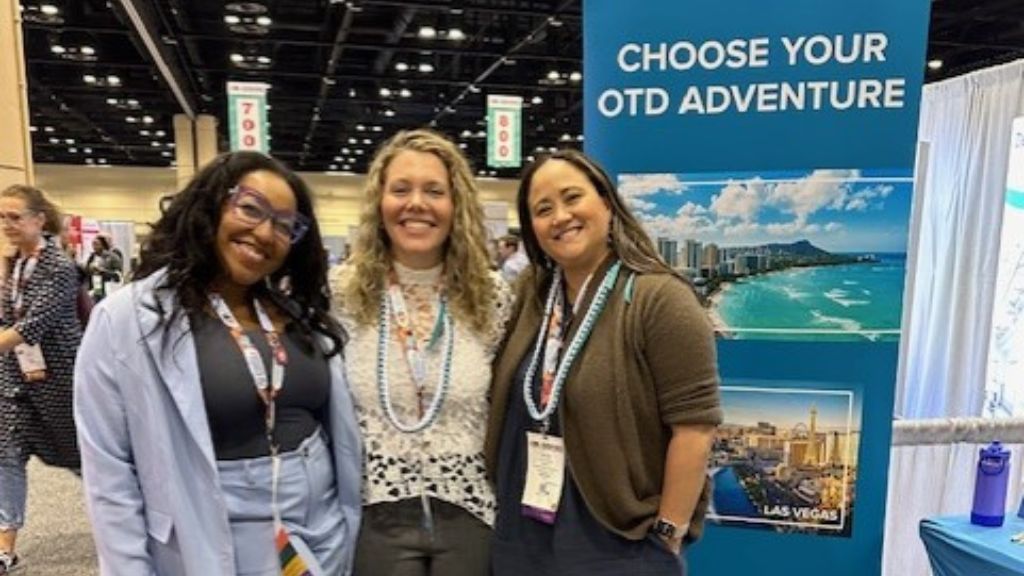
At the 2024 American Occupational Therapy Association INSPIRE Conference and Expo held in Orlando, March 21-23, Briana "Dr. Bri the OT" Bonner, OTD, OTR/L of A.T. Still University with HPU OTD Las Vegas Program faculty Susan Lingelbach, OTD, OTR/L, and Julia Graham, OTD, MFA, OTR/L.
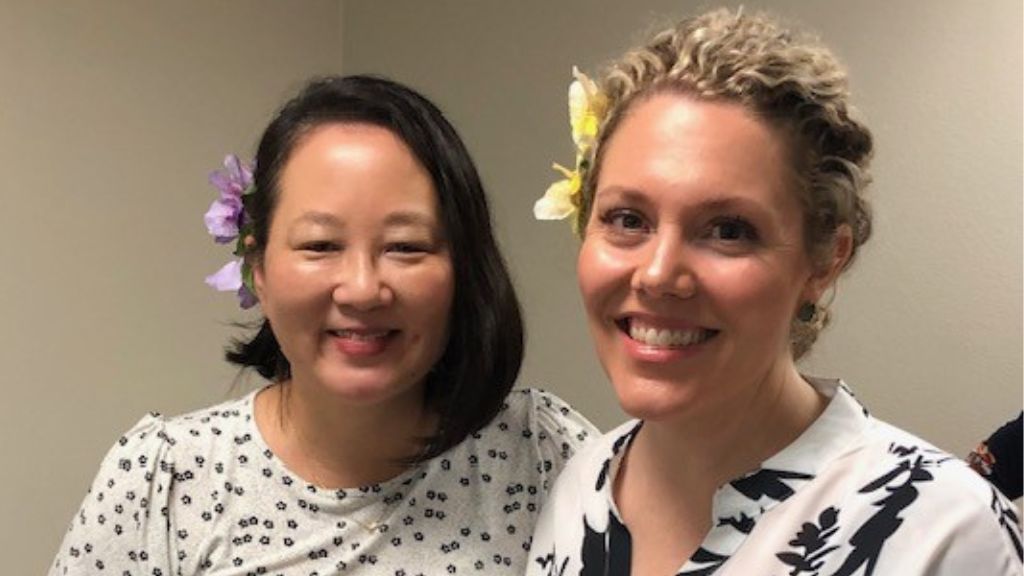
Occupational Therapy Doctorate Las Vegas Program Director and Professor Robyn Otty, OTD, OTR/L, BCPR, FAOTA, and Director of Admissions and Assistant Professor Susan Lingelbach, OTD, OTR/L.
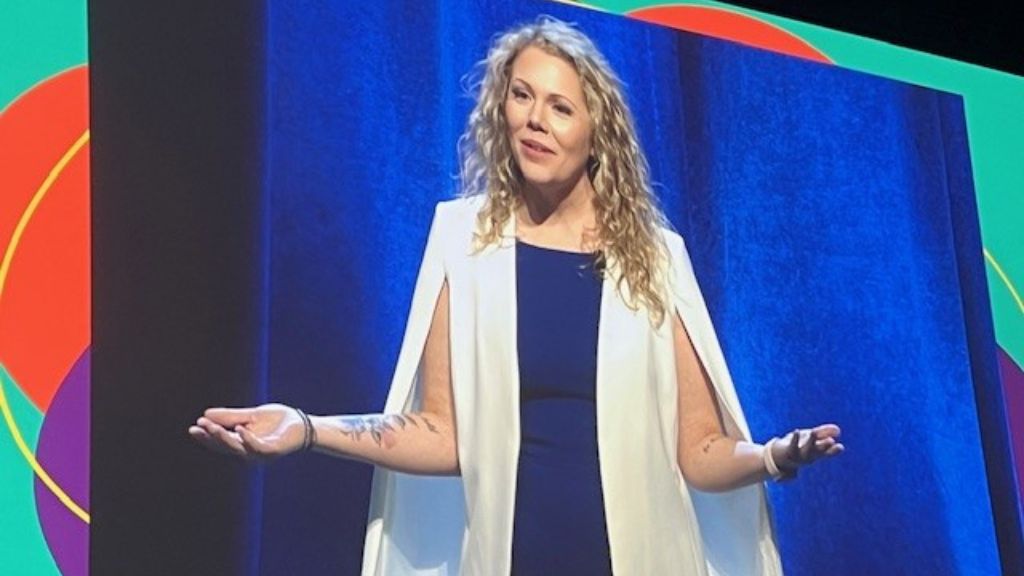
Susan Lingelbach delivers a keynote presentation on burnout with Second City at the 2023 AOTA INSPIRE Conference.
Occupational therapy is, for many, an enigma in the healthcare landscape but it’s a critical resource offering individuals the tools they need to live their fullest lives despite physical, emotional, or cognitive challenges. Susan Lingelbach, OTD, OTR/L is one such clinician who is transforming lives through applied practice and research, and as an Assistant Professor and Director of Admissions for Hawaiʻi Pacific University’s new graduate Occupational Therapy Doctorate program in Las Vegas, she is creating a lasting impact on the future of the profession.
From Stage Lights to Spotlight of Care
Lingelbach’s story begins in the unlikely world of theater. With a passion for performance and an undergraduate degree in theater arts, her early career was far removed from the clinical settings she thrives in today. However, it was this unique background that laid the groundwork for her future in occupational therapy—a field that values creativity and adaptability as much as scientific knowledge.
The transition from the world of theater to occupational therapy was not immediate. For years, Lingelbach charted a path filled with diverse experiences, from working in a veterinary office to exploring different career options. Then, after receiving a serendipitous gift in the form of a career guidance book from her mother, a long-forgotten suggestion reignited in her mind: occupational therapy.
“I originally found out about the field in high school while working with a special education class. The teacher recommended I look into occupational therapy, but I didn’t think anything of it and went on my merry way. I was directionless in my career for many years until I was given ‘Cool Careers for Dummies’,” she laughed. “I took the aptitude test, and the highest pairing was with occupational therapy. This was now the second time I crossed paths with the field, so I did some research and after I read more about it, I thought, ‘Oh my gosh, why didn’t I see this earlier?’”
This epiphany led Lingelbach to the University of Southern California where she completed a Master’s degree in Occupational Therapy, followed by a Post-Professional Doctorate focusing on research and teaching from Thomas Jefferson University.
A Clinical Journey Through Diverse Settings
Lingelbach’s clinical background is marked by an impressive diversity of experiences. From school-based occupational therapy to in-patient rehabilitation and community-based work with refugees, her career reflects a profound commitment to serving a wide range of client needs. It was in the dynamic and demanding environment of school-based OT that Lingelbach found her calling, working across over three states and seven school districts, each with its unique challenges and opportunities.
“It’s not uncommon for an occupational therapist to remain at a single job for many years. But I’m from a small town in Northern Nevada and it was my goal to travel all around the west coast of the United States and live in different places. It served me well because it exposed me to some really lovely and unique things that therapists are doing that I wouldn’t have known about otherwise,” she explained.
This varied experience not only honed her clinical skills but also deepened her understanding of the profession’s core values. “No matter where you are, the core of the profession is always the same,” she noted. She also emphasized the universal goal of helping individuals engage meaningfully in life through occupation.
So, what is occupational therapy?
“Occupational therapy isn’t just about occupation in terms of a job,” Lingelbach said. “Occupation is anything that occupies your time. An occupational therapist finds what is meaningful for an individual person, a group of people, or a population they’re working with and helps them live the best lives they possibly can through engagement in occupation.”
According to the American Occupational Therapy Association (AOTA), occupational therapy promotes health, well-being, and participation by enabling people of all ages to take part in daily living. Examples of occupational therapy activities range from teaching activities such as bathing, dressing, and eating to the implementation of adaptive equipment like shower chairs or increasing the accessibility of buttons on daily appliances to promoting techniques to aid in memory, concentration, and executive functioning. Occupational therapists may also provide caregiver and family training, and work with patients and clients on fall prevention, home safety, and accessibility strategies.
In school settings, like Lingelbach’s predominant experience, occupational therapists help students transition between activities and places, use strategies to complete assignments and turn in work on time, or follow classroom rules and routines. OTs may also help children organize their desks and lockers, use school supplies and equipment, and develop coping mechanisms for a wide range of behavioral and emotional management needs.
Regardless of the setting, however, the goal of an occupational therapist remains the same, “Helping you do those things that you need to do or are expected to do in society that makes up your life and teach you how to be an advocate for yourself and your needs,” Lingelbach said.
Tackling Burnout: A Researcher’s Quest
Amidst her clinical successes, Lingelbach confronted a pervasive challenge within her profession: burnout. Motivated by her personal experiences and a desire to support her peers, she embarked on qualitative research to explore burnout among occupational practitioners, particularly in school-based settings. Her findings highlighted the high stress and chaos inherent in such environments, compounded by the aftermath of the pandemic.
“We spend most of our education on healthcare settings and not on educational or school settings despite 20 percent of occupational therapist practitioners working in that practice area,” Lingelbach said. “My research focused on those challenges occupational therapy practitioners face in terms of knowing their role within a school, having other professionals understand their role, the stressors of operating in a chaotic environment, and the added stressors contributed by COVID. I used arts-based methods and interviews to gather my data as well as an arts-based method of dissemination, which is somewhat unique in OT research.”
Lingelbach’s research not only shed light on the factors contributing to burnout but also underscored the need for systemic solutions to support the well-being of OT practitioners. Through national presentations and creative collaborations with organizations like the acclaimed Chicago-based improvisation group Second City, she has become a vocal advocate for practitioner wellness, integrating insights from her research into actionable strategies for combatting burnout in the field.
“We [Second City] delivered a presentation at last year’s AOTA national conference about using improv skills in communication as one of the ways to combat burnout in occupational therapy practice,” she said. “Practitioner well-being is a big passion of mine.”
Shaping the Future of OT at HPU
HPU is launching a hybrid OT doctoral program based at the new Las Vegas campus that is designed to address the current and future needs of the profession. As the Director of Admissions for the program, Lingelbach’s focus is on championing diversity and accessibility in occupational therapy and recognizes the critical importance of representing the communities OTs serve.
“As a whole, the western United States is very rural. We are hoping this program will draw people who will then go back to these geographic pockets that lack occupational therapy services and implement high quality healthcare in their hometowns,” Lingelbach said.
The hybrid nature of the program is a pioneering effort combining online and in-person learning and reflects HPU’s commitment to breaking down barriers to education and professional development.
“One thing that captured my attention about this program was having Dr. Robyn Otty as the program director. I’ve worked with her in the past and not only is her leadership incredible but also she knows how to create a sense of belonging within a team and that’s something I wanted to be a part of,” she said.
Under Lingelbach’s guidance, the OT program is poised to cultivate a new generation of occupational therapists equipped to meet the challenges of a diverse and changing world. Its emphasis on inclusivity, holistic care, and the integration of technology in education aligns with the broader goals of the occupational therapy profession to enhance human lives and communities.
“Overall, the accelerated nature of the program and HPU’s values really aligned with my own personal values of ensuring things like occupational justice, creating opportunities for more people to give and get help, and moving through the world with more kindness and humility,” she explained.
A Call to Action for Aspiring Occupational Therapists
For those drawn to the field of occupational therapy, Lingelbach offers both inspiration and realism. Acknowledging the hard work and challenges inherent in the profession, she remains unwavering in her passion and optimism for the impact occupational therapists can make.
“There’s nothing quite like it,” she said, reflecting on the satisfaction that comes from helping others lead more fulfilling lives.
Building community is key among occupational therapists, Lingelbach also said. It’s an idea at the forefront of her priorities as the President of the Nevada Occupational Therapy Association.
“This role comes with a big sense of responsibility,” she said. “We want people to feel like they belong in this profession and that they not only feel like they have a place in occupational therapy but within the Nevada occupational therapy community.”
Continuing education, webinars, and hosting the first in person conference since before the pandemic, The Nevada Rise Conference on May 18th at Las Vegas City Hall, are all initiatives that Lingelbach is championing on behalf of her colleagues across the state.
As the occupational therapy profession continues to evolve, figures like Dr. Susan Lingelbach serve as guiding lights, embodying the values of creativity, empathy, and resilience. Through her work as a clinician, researcher, and educator, she is not only shaping the future of occupational therapy at HPU but also inspiring the next generation of therapists to pursue their calling with courage, innovation, and a deep commitment to improving the human condition.
All News >>
School of social work professor honored with lifetime achievement award, hpu hosts 2024 hawai'i state economics challenge, hpu announces new master's degree in data science, hpu hosts the 2024 pan pacific debate championship, winners of the 2024 short script contest announced.

FOLLOW US ON SOCIAL MEDIA
- Alzheimer's disease & dementia
- Arthritis & Rheumatism
- Attention deficit disorders
- Autism spectrum disorders
- Biomedical technology
- Diseases, Conditions, Syndromes
- Endocrinology & Metabolism
- Gastroenterology
- Gerontology & Geriatrics
- Health informatics
- Inflammatory disorders
- Medical economics
- Medical research
- Medications
- Neuroscience
- Obstetrics & gynaecology
- Oncology & Cancer
- Ophthalmology
- Overweight & Obesity
- Parkinson's & Movement disorders
- Psychology & Psychiatry
- Radiology & Imaging
- Sleep disorders
- Sports medicine & Kinesiology
- Vaccination
- Breast cancer
- Cardiovascular disease
- Chronic obstructive pulmonary disease
- Colon cancer
- Coronary artery disease
- Heart attack
- Heart disease
- High blood pressure
- Kidney disease
- Lung cancer
- Multiple sclerosis
- Myocardial infarction
- Ovarian cancer
- Post traumatic stress disorder
- Rheumatoid arthritis
- Schizophrenia
- Skin cancer
- Type 2 diabetes
- Full List »
share this!
April 8, 2024
This article has been reviewed according to Science X's editorial process and policies . Editors have highlighted the following attributes while ensuring the content's credibility:
fact-checked
trusted source
Q&A: A task-oriented approach in occupational therapy is critical to recovery after a stroke
by University of Nevada, Las Vegas
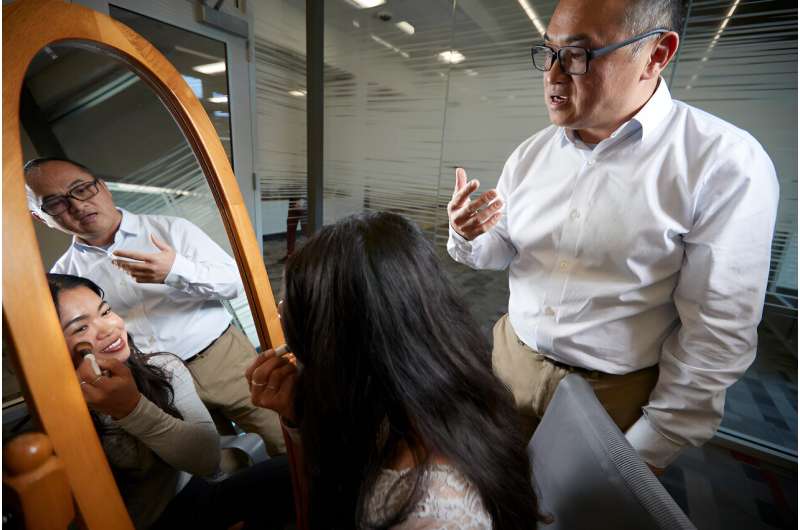
Recovering from a life-altering stroke can be a long and arduous journey when an irascible demeanor and a litany of frustrations prolong a patient's return to normalcy.
Stroke is the leading cause of death in the United States and a major cause of serious disability for adults, according to the Centers for Disease Control and Prevention.
A task-oriented, client-centered approach is the preferred method of rehab for stroke patients, says Chih-Huang "Jeffrey" Yu, an assistant professor in the Department of Brain Health's occupational therapy doctorate program within the UNLV School of Integrated Health Sciences.
"A typical rehab is more of a one-size-fits-all approach, and a lot of times, our clients can feel frustrated by that approach," he said.
"The occupational therapy task-oriented approach allows us to really learn more about the person, their life, what kind of tasks they were able to do before their stroke that they're not able to do anymore, and determine a strategy to improve their performance effectively. That's why I really need to understand and get to know the person so I can establish their own personal plan going forward. We really have to put ourselves in their shoes."
Occupational therapists help people achieve the things they want to do, not just what they need to do, after experiencing a health affliction. They approach a person holistically to improve their physical, spiritual, and emotional health in an effort to maximize their overall well-being.
Yu has been a practicing occupational therapist since the mid-1990s. Born and raised in Taiwan, he honed his skills using the occupational therapy task-oriented approach while studying at the University of Minnesota in 2010.
According to Yu, the task-oriented approach is a novel concept in occupational therapy, with Yu having published one of just two articles on the subject. We spoke with him about how occupational therapists , especially those utilizing a task-oriented approach, can impact the lives of stroke patients while making their long road to recovery a little less stressful.
For those unfamiliar with occupational therapy, can you explain how occupational therapists work with stroke patients?
Occupational therapists work on how we can best help our clients (we refer to them as "clients" in outpatient settings and "patients" during acute care and inpatient settings) to do the things that they most value. These are tasks that people do on a daily basis that take up their time and are also meaningful to them.
As an example, I am a father, a son, and a husband, and I work at a university. I also need to do things that give me life, like eating, shopping, and other tasks that give me the fulfillment I need. As a father and husband, I need to spend quality time with my daughter and my wife. Those tasks take up my time and are meaningful for me. After a stroke, I may be able to do some of those tasks, but not all of them.
Occupational therapists are experts in working with our clients to address the areas with the most need, and we customize our plans for each client. You might eat your breakfast at home or at work, where it's quiet, and I might eat my breakfast while watching videos on my couch. Even though we are both having breakfast, we are eating it differently. They are different experiences that affect us in our own way.
As occupational therapists, we also educate our clients to ensure they are rehabbing in the healthiest way. We believe everything is parallel to each other. The task, the environment, and someone's personal ability are parallel, and we regard them as separate systems. When using the occupational therapy task-oriented approach, you need to spend a lot of time working with a client.
Why is there a dearth of published information about the task-oriented approach in occupational therapy, specifically working with stroke patients? The occupational therapy task-oriented approach was first proposed by my mentor, Virgil Mathiowetz, in Minnesota in 1994. He and one of his colleagues proposed this at a time when occupational therapy was focused on a medical model, so the rehab world did not accept this type of thinking.
This also makes funding more difficult because it is not a mainstream approach, and research opportunities are limited. I wanted to learn his approach even though I knew it was risky [in terms of research funding opportunities]. After I did some more research on it, I moved from Taiwan to study under him while being sponsored by the occupational therapy program at the University of Minnesota.
Over the past 20 years, especially in motor learning theory, we have seen an increase in awareness about how the environment is very important to a client's recovery. There have been a few case studies done about occupational therapists using the task-oriented approach, but not much. It is a different approach than most health care professionals use, but the new model is moving toward a whole-body approach.
How have you seen the difference in a patient's recovery process between a more generalized approach and a multi-task approach?
I really saw the difference when working on my dissertation. After three or four weeks of intervention with a stroke patient, his motor skill issue had become a psychological issue. My assumption was that his ability to move was holding him back, but it turned out to be psychosocial. Once we established that it wasn't his mobility that necessarily contributed to his motor skill issue, the recovery process was easier because we knew what to focus on.
That is why we treat each system as its own. Systems can trigger change. By the end of the study, the man was able to regain his driver's license just a few years after suffering a stroke.
Sometimes, you have to change your entire intervention strategy based on the needs of the patient. It was a perfect example of why it is so important to pay attention to the little things. You have to put yourself in their shoes and not come in with your own perception in order to find out what's wrong. I witnessed the power of that personalized, task-oriented approach, and I want to produce more research to share with our society.
What do you hope the future holds for more occupational therapists using the task-oriented approach?
As capstone coordinator for UNLV's occupational therapy program, I coordinate scholarly projects for our students. Right now, I'm trying to recruit students to do stroke rehab while guiding them toward the occupational therapy task-oriented approach. In terms of research evidence, our studies have only been done with patients who have had a stroke, and our students are eager to learn more.
I spent 20 years in the clinic, and my goal is to develop a clinical protocol for the occupational therapy task-oriented approach. Task-oriented approaches aren't currently covered by insurance companies. I want to create a protocol for therapists to use so it becomes more acceptable. I hope that more people recognize its effectiveness so they can use it to benefit their patients.
Explore further
Feedback to editors

Researchers demonstrate miniature brain stimulator in humans
20 hours ago

Study reveals potential to reverse lung fibrosis using the body's own healing technique
Apr 12, 2024

Researchers discover cell 'crosstalk' that triggers cancer cachexia

Study improves understanding of effects of household air pollution during pregnancy

Wearable sensors for Parkinson's can improve with machine learning, data from healthy adults

New insights on B cells: Researchers explore building better antibodies and curbing autoimmune diseases

Grieving pet owners comforted by 'supernatural' interactions

Study shows AI improves accuracy of skin cancer diagnoses

Cell's 'garbage disposal' may have another role: Helping neurons near skin sense the environment

Chlamydia vaccine shows promise in early trial
Related stories.

Goal-oriented rehab improves recovery in older adults
Jul 31, 2019

Many patients receive too little rehab therapy following stroke, study finds
Feb 6, 2023

Research shows in-school occupational therapy creates positive education experiences for kids with autism
Aug 16, 2023

Regaining sense of touch after stroke
Jul 13, 2022

Therapy at home helping people with dementia
Jan 6, 2020

Video game–based therapy to rehab from a stroke
Mar 9, 2022
Recommended for you

Study finds that dopamine projections to the amygdala contribute to encoding identity-specific reward memories

How the inflamed brain becomes disconnected after a stroke

Two key brain systems are central to psychosis, study finds
Apr 11, 2024

Scientists discover groups of spinal cord neurons that allow for brain-independent motor learning

Decoding spontaneous thoughts from the brain via machine learning
Let us know if there is a problem with our content.
Use this form if you have come across a typo, inaccuracy or would like to send an edit request for the content on this page. For general inquiries, please use our contact form . For general feedback, use the public comments section below (please adhere to guidelines ).
Please select the most appropriate category to facilitate processing of your request
Thank you for taking time to provide your feedback to the editors.
Your feedback is important to us. However, we do not guarantee individual replies due to the high volume of messages.
E-mail the story
Your email address is used only to let the recipient know who sent the email. Neither your address nor the recipient's address will be used for any other purpose. The information you enter will appear in your e-mail message and is not retained by Medical Xpress in any form.
Newsletter sign up
Get weekly and/or daily updates delivered to your inbox. You can unsubscribe at any time and we'll never share your details to third parties.
More information Privacy policy
Donate and enjoy an ad-free experience
We keep our content available to everyone. Consider supporting Science X's mission by getting a premium account.
E-mail newsletter

A Crash Course in Critical Thinking
What you need to know—and read—about one of the essential skills needed today..
Posted April 8, 2024 | Reviewed by Michelle Quirk
- In research for "A More Beautiful Question," I did a deep dive into the current crisis in critical thinking.
- Many people may think of themselves as critical thinkers, but they actually are not.
- Here is a series of questions you can ask yourself to try to ensure that you are thinking critically.
Conspiracy theories. Inability to distinguish facts from falsehoods. Widespread confusion about who and what to believe.
These are some of the hallmarks of the current crisis in critical thinking—which just might be the issue of our times. Because if people aren’t willing or able to think critically as they choose potential leaders, they’re apt to choose bad ones. And if they can’t judge whether the information they’re receiving is sound, they may follow faulty advice while ignoring recommendations that are science-based and solid (and perhaps life-saving).
Moreover, as a society, if we can’t think critically about the many serious challenges we face, it becomes more difficult to agree on what those challenges are—much less solve them.
On a personal level, critical thinking can enable you to make better everyday decisions. It can help you make sense of an increasingly complex and confusing world.
In the new expanded edition of my book A More Beautiful Question ( AMBQ ), I took a deep dive into critical thinking. Here are a few key things I learned.
First off, before you can get better at critical thinking, you should understand what it is. It’s not just about being a skeptic. When thinking critically, we are thoughtfully reasoning, evaluating, and making decisions based on evidence and logic. And—perhaps most important—while doing this, a critical thinker always strives to be open-minded and fair-minded . That’s not easy: It demands that you constantly question your assumptions and biases and that you always remain open to considering opposing views.
In today’s polarized environment, many people think of themselves as critical thinkers simply because they ask skeptical questions—often directed at, say, certain government policies or ideas espoused by those on the “other side” of the political divide. The problem is, they may not be asking these questions with an open mind or a willingness to fairly consider opposing views.
When people do this, they’re engaging in “weak-sense critical thinking”—a term popularized by the late Richard Paul, a co-founder of The Foundation for Critical Thinking . “Weak-sense critical thinking” means applying the tools and practices of critical thinking—questioning, investigating, evaluating—but with the sole purpose of confirming one’s own bias or serving an agenda.
In AMBQ , I lay out a series of questions you can ask yourself to try to ensure that you’re thinking critically. Here are some of the questions to consider:
- Why do I believe what I believe?
- Are my views based on evidence?
- Have I fairly and thoughtfully considered differing viewpoints?
- Am I truly open to changing my mind?
Of course, becoming a better critical thinker is not as simple as just asking yourself a few questions. Critical thinking is a habit of mind that must be developed and strengthened over time. In effect, you must train yourself to think in a manner that is more effortful, aware, grounded, and balanced.
For those interested in giving themselves a crash course in critical thinking—something I did myself, as I was working on my book—I thought it might be helpful to share a list of some of the books that have shaped my own thinking on this subject. As a self-interested author, I naturally would suggest that you start with the new 10th-anniversary edition of A More Beautiful Question , but beyond that, here are the top eight critical-thinking books I’d recommend.
The Demon-Haunted World: Science as a Candle in the Dark , by Carl Sagan
This book simply must top the list, because the late scientist and author Carl Sagan continues to be such a bright shining light in the critical thinking universe. Chapter 12 includes the details on Sagan’s famous “baloney detection kit,” a collection of lessons and tips on how to deal with bogus arguments and logical fallacies.

Clear Thinking: Turning Ordinary Moments Into Extraordinary Results , by Shane Parrish
The creator of the Farnham Street website and host of the “Knowledge Project” podcast explains how to contend with biases and unconscious reactions so you can make better everyday decisions. It contains insights from many of the brilliant thinkers Shane has studied.
Good Thinking: Why Flawed Logic Puts Us All at Risk and How Critical Thinking Can Save the World , by David Robert Grimes
A brilliant, comprehensive 2021 book on critical thinking that, to my mind, hasn’t received nearly enough attention . The scientist Grimes dissects bad thinking, shows why it persists, and offers the tools to defeat it.
Think Again: The Power of Knowing What You Don't Know , by Adam Grant
Intellectual humility—being willing to admit that you might be wrong—is what this book is primarily about. But Adam, the renowned Wharton psychology professor and bestselling author, takes the reader on a mind-opening journey with colorful stories and characters.
Think Like a Detective: A Kid's Guide to Critical Thinking , by David Pakman
The popular YouTuber and podcast host Pakman—normally known for talking politics —has written a terrific primer on critical thinking for children. The illustrated book presents critical thinking as a “superpower” that enables kids to unlock mysteries and dig for truth. (I also recommend Pakman’s second kids’ book called Think Like a Scientist .)
Rationality: What It Is, Why It Seems Scarce, Why It Matters , by Steven Pinker
The Harvard psychology professor Pinker tackles conspiracy theories head-on but also explores concepts involving risk/reward, probability and randomness, and correlation/causation. And if that strikes you as daunting, be assured that Pinker makes it lively and accessible.
How Minds Change: The Surprising Science of Belief, Opinion and Persuasion , by David McRaney
David is a science writer who hosts the popular podcast “You Are Not So Smart” (and his ideas are featured in A More Beautiful Question ). His well-written book looks at ways you can actually get through to people who see the world very differently than you (hint: bludgeoning them with facts definitely won’t work).
A Healthy Democracy's Best Hope: Building the Critical Thinking Habit , by M Neil Browne and Chelsea Kulhanek
Neil Browne, author of the seminal Asking the Right Questions: A Guide to Critical Thinking, has been a pioneer in presenting critical thinking as a question-based approach to making sense of the world around us. His newest book, co-authored with Chelsea Kulhanek, breaks down critical thinking into “11 explosive questions”—including the “priors question” (which challenges us to question assumptions), the “evidence question” (focusing on how to evaluate and weigh evidence), and the “humility question” (which reminds us that a critical thinker must be humble enough to consider the possibility of being wrong).

Warren Berger is a longtime journalist and author of A More Beautiful Question .
- Find a Therapist
- Find a Treatment Center
- Find a Support Group
- International
- New Zealand
- South Africa
- Switzerland
- Asperger's
- Bipolar Disorder
- Chronic Pain
- Eating Disorders
- Passive Aggression
- Personality
- Goal Setting
- Positive Psychology
- Stopping Smoking
- Low Sexual Desire
- Relationships
- Child Development
- Therapy Center NEW
- Diagnosis Dictionary
- Types of Therapy

Understanding what emotional intelligence looks like and the steps needed to improve it could light a path to a more emotionally adept world.
- Coronavirus Disease 2019
- Affective Forecasting
- Neuroscience

COMMENTS
These skills, together, allow us to integrate the areas of strategic thinking that we need to accomplish tasks: -Regulate emotions and behaviors. -Pay attention during tasks. -Complete tasks with an awareness of working memory. -Initiate tasks when it can be hard to decide on the best "first step".
The four themes were: 1) critical thinking is a process with varied outcomes; 2) learner aptitude essential for developing critical thinking; 3) critical thinking can be facilitated through various methods; and 4) critical thinking underpins other important constructs in occupational therapy.
Additionally, critical thinking skills are used by the occupational therapy practitioner to evaluate the credibility of, interpret, and synthesize knowledge prior to applying it within the ...
Critical thinking skills are being incorporated into models of the 'ideal' practitioner in a variety of disciplines, including occupational therapy (Schemm et al., 1993), as well as being an explicit expectation of accred-iting bodies for health professionals. For example, the National League of Nurses has listed critical thinking as a ...
Four themes emerged: 1) critical thinking is a process with varied outcomes; 2) learner aptitude is essential for developing critical thinking; 3) critical thinking can be facilitated through various methods; and 4) critical thinking underpins other important constructs in occupational therapy. Needs that were identified were that critical ...
However, the students in the experimental group asked more questions labelled as critical thinking than the seminar control group. These findings suggest the use of the GRPQ may improve students' skills in asking questions that include application, analysis, and synthesis.
This paper explores the effectiveness of peer assisted learning on developing critical thinking skills in an occupational therapy graduate course. The use of peer teaching strategies, including a Fishbowl discussion and case-based problem solving, were compared to a faculty-led lecture approach to determine which approach best prepared
In occupational therapy literature, critical thinking skills are referred to or used in conjunction with professional reasoning (Boyt Schell, 2009). Due to the requirement of critical thinking skills in one's career as an occupational therapist, it is essential that the development and enhancement of these skills be addressed in occupational ...
Needs that were identified were that critical thinking is best intentionally threaded across a curriculum with outcomes in mind; and more studies examining critical thinking in occupational therapy education, employing diverse designs, are needed. Abstract Critical thinking is a component of occupational therapy education that is often intertwined with professional reasoning, even though it is ...
1. Introduction. Encouraged by the studies on diagnostic reasoning done by the discipline of medicine since the early 1980s, the study of professional reasoning in occupational therapy has led to several lines of research [].One of the most important lines is the study of the information processing involved in diagnostic reasoning understood as a process of problem solving or decision making ...
or critical thinking in occupational therapy students may develop over time (Lederer, 2007; Mattingly, 1991; Rogers, 1983; Vogel, Geelhoed, Grice, & Murphy, 2009). In addition, limited research exists in ... types of cases have been used in occupational therapy education to facilitate clinical reasoning in
Despite a growing body of evidence to support the use of a wide variety of instruction methods for critical thinking, a survey of occupational therapy educators revealed that the actual use of ...
1. Introduction. In occupational therapy, professional reasoning can be defined as the process used by practitioners to plan, direct, perform, and reflect on client care [1, 2].Its importance in professional practice is fundamental given that the professional's ability to manage the process of assessing, planning, and implementing the intervention is structured around it, thereby influencing ...
The World Federation of Occupational Therapists recommends an occupation-focused curriculum that includes critical thinking, problem ... have argued that undergraduate research education has an impact on nursing students' research skills and use of EBP. Students in occupational therapy and physiotherapy have been found to share ...
An important aspect of experiential learning is the interaction with real clients. Case-based learning can also be used to create an authentic simulation to help develop critical thinking skills (Thistlewaite et al., 2012). Authenticity can be improved using client videos and cases the students are likely to see.
All three areas of critical thinking, confidence, and anxiety improved, demonstrating a significance of p, all of which improved in the clinical setting. Critical thinking is a necessary component of clinical reasoning that should be addressed as part of the graduate curriculum for occupational therapists. For students to apply critical thinking in practice they must also have confidence and ...
effective care; however, there is limited evidence on the development of critical thinking skills in occupational therapy education. The purpose of this study was to explore the effects and student perceptions of concept mapping on critical thinking skills in occupational therapy education. This study used a quasi-experimental design with a
However, the students in the experimental group asked more questions labelled as critical thinking than the seminar control group. These findings suggest the use of the GRPQ may improve students' skills in asking questions that include application, analysis, and synthesis.
2017. TLDR. It seems that occupational therapy BSc students' critical thinking skills are not well-developed during their studies at Shahid Beheshti University of Medical Sciences, Tehran, and revising teaching methods and the occupation therapy curriculum seems necessary and beneficial. Expand.
Critical thinking is a necessary component of clinical reasoning that should be addressed as part of the graduate curriculum for occupational therapists. For students to apply critical thinking in practice they must also have confidence and minimal anxiety about their abilities. Case-based learning was chosen to address critical thinking skill development, increase confidence, and decrease ...
The CCTDI appears to be a useful instrument for assessing the ability and disposition for critical thinking and could serve as a reliable baseline or outcome measure for use in programs. The ability to think critically is an important outcome of education. The disposition, or internal motivation, to think critically strongly influences the development of critical thought. Students (N = 79) at ...
Occupational therapy is, for many, an enigma in the healthcare landscape but it's a critical resource offering individuals the tools they need to live their fullest lives despite physical, emotional, or cognitive challenges. Susan Lingelbach, OTD, OTR/L is one such clinician who is transforming lives through applied practice and research, and as an Assistant Professor and Director of ...
A task-oriented, client-centered approach is the preferred method of rehab for stroke patients, says Chih-Huang "Jeffrey" Yu, an assistant professor in the Department of Brain Health's ...
Evidence-based practice (EBP) is a critical framework for supporting clinical decision-making that has been increasingly promoted in occupational therapy over the last 20 years. Discipline-specific EBP frameworks and resources have emerged, primarily created by scholars from developed countries.
Eficient and effective occupational therapy curricular and course design is essential to develop competent and reflective practitioners. The intentional use of metacognitive strategies could improve the development of higher-order thinking and learning outcomes. The study explored the use of metacognitive strategies to improve learning and ...
Here is a series of questions you can ask yourself to try to ensure that you are thinking critically. Conspiracy theories. Inability to distinguish facts from falsehoods. Widespread confusion ...